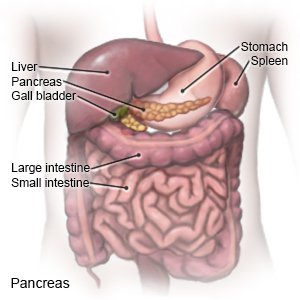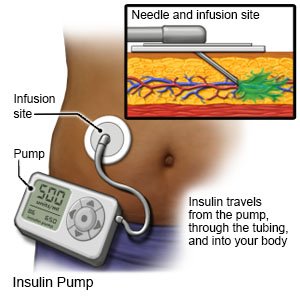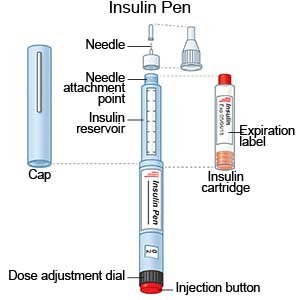Gestational Diabetes
Medically reviewed by Drugs.com. Last updated on May 6, 2024.
Gestational diabetes (GDM) is a type of diabetes that develops during pregnancy, usually in the second or third trimester. GDM causes your blood sugar level to rise too high. This can harm you and your unborn baby. Blood sugar levels usually go back to normal after the baby is born. GDM may be controlled with meal planning and physical activity. The goal is to keep your blood sugar level as close to normal, as safely as possible. Your diabetes care team provider may order blood glucose monitoring to check your levels several times each day. The checks will be done if you need to stay in the hospital, and you will need to check at home.
 |
WHILE YOU ARE HERE:
Informed consent
is a legal document that explains the tests, treatments, or procedures that you may need. Informed consent means you understand what will be done and can make decisions about what you want. You give your permission when you sign the consent form. You can have someone sign this form for you if you are not able to sign it. You have the right to understand your medical care in words you know. Before you sign the consent form, understand the risks and benefits of what will be done. Make sure all your questions are answered.
An IV
is a small tube placed in your vein that is used to give you medicine or liquids.
A dietitian
may work with you to find a meal plan that will help you control your blood sugar. Ask how your favorite foods may fit into this meal plan. Ask your healthcare provider for more information about meal planning.
Insulin
may be given to decrease the amount of sugar in your blood. Insulin may be given by injections, or you may have an insulin pump or pen. An insulin pump is an implanted device that gives you a constant amount of insulin through the day. The amount changes when the number of carbohydrates is entered. An insulin pen is a device prefilled with the right amount of insulin. You and your care team will discuss which method is best for you.
 |
 |
Tests:
- Blood glucose tests will be done several times each day. Examples include before you have eaten anything (fasting) and again after each meal. Your fasting blood sugar level may need to be between 70 and 95 mg/dL. The level may need to be 110 to 140 mg/dL 1 hour after you eat or 100 to 120 mg/dL 2 hours after you eat. Your provider may give you higher target levels if you are at risk for hypoglycemia. Your level may also be checked at other times, such as with activity or at bedtime. Your provider will tell you what the level should be at the other times.
- A urine sample may show the amount of ketones and sugar in your urine. This test helps show how well your blood sugar level is being controlled and if you need more tests.
- Fetal monitoring is used to check your baby's heartbeat and the contractions of your uterus. A small disc or ultrasound wand with gel on it is placed on your abdomen. A belt may be fastened around your waist to hold the disc in place. The disc or wand may need to be moved as your baby moves inside you. The disc or wand is attached to a monitor that shows your baby's movement, heartbeat, or your contractions.
Treatment options
The following list of medications are related to or used in the treatment of this condition.
Diabetes education:
Healthcare providers will teach you how to manage your diabetes. They may visit your home, you may attend classes, or speak to them on the phone. They will teach you what to do if your blood sugar level goes too high or too low. They will also help you plan sick day management. Ask how to dispose of used needles and syringes.
RISKS:
- You have an increased risk for premature (early) labor, miscarriage, or a C-section delivery. Your risk for preeclampsia (high blood pressure during pregnancy) is increased. You may develop GDM with future pregnancies. You have a higher risk for bladder or vaginal infections. You may develop diabetes after you deliver your baby. You have an increased risk for developing heart disease later in life.
- Your baby may weigh more than 8½ pounds at birth. Your baby may also develop hypoglycemia (low blood sugar) after birth. Your baby may also have a birth defect or develop newborn jaundice (yellowing of the skin). Your baby may also have neonatal respiratory distress syndrome (breathing problems). Your baby's risk for obesity, high blood pressure, and type 2 diabetes as an adult is increased.
CARE AGREEMENT:
You have the right to help plan your care. Learn about your health condition and how it may be treated. Discuss treatment options with your healthcare providers to decide what care you want to receive. You always have the right to refuse treatment.© Copyright Merative 2024 Information is for End User's use only and may not be sold, redistributed or otherwise used for commercial purposes.
The above information is an educational aid only. It is not intended as medical advice for individual conditions or treatments. Talk to your doctor, nurse or pharmacist before following any medical regimen to see if it is safe and effective for you.
Learn more about Gestational Diabetes
Treatment options
- Medications for Abnormal Glucose Tolerance
- Medications for Diabetes Mellitus
- Medications for Gestational Diabetes
Care guides
Symptoms and treatments
Medicine.com guides (external)
Further information
Always consult your healthcare provider to ensure the information displayed on this page applies to your personal circumstances.
